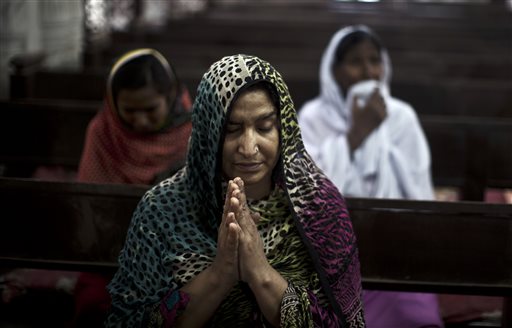Suicide bombers three times over the last month targeted Pakistani Christians — first on a bus, then at a hospital and then at a bazaar.
Videos By Rare
“It’s just not sexy,” said Hugh Iwanicki, a former auditor for the U.S. State Department, during an exclusive interview with Rare. “In fact, in today’s environment, it takes courage to simply call attention to the issue, but I can no longer remain silent.”
Mr. Iwanicki, in his self-published book “Shock and Alarm: What it was really like at the U.S. Embassy in Iraq,” sheds light on the plight of Christians in the Middle East.
Religious persecution in the region is on the rise but few headlines advertise the fact.
“They aren’t giving us our freedom,” Mr. Iwanicki’s friend, who asked to remain anonymous, said of the escalating persecution in Pakistan.
“Every day our life is painful. If there is Christian leadership, they kill,” said the man, who immigrated to the U.S. in 2005 and recently returned from a Pakistani missions trip after witnessing a church suicide bombing in September that killed over 100 people and injured hundreds more.
He expounded on Islamic rule in the Middle East.
“When [Muslims] are in the minority, they say they want rights. But when they are in the majority, they deny rights.”
Mr. Iwanicki’s friend regularly conducts mission trips in the Middle East, visiting the region a couple times a year. He is slated to leave either this early in 2014 to visit an orphanage.
Some U.S. congressmen have tried to take action against such persecution.
Fox News contributor Kirsten Powers noted in January that Rep. Frank Wolf (R-Va.) wrote a letter to 300 Christian leaders, complaining about their lack of engagement. “Can you, as a leader in the church, help?” he wrote. “Are you pained by these accounts of persecution? Will you use your sphere of influence to raise the profile of this issue — be it through a sermon, writing or media interview?”
There have been a few takers. Reps. Wolf and Anna Eshoo (D-Calif.) last year sponsored legislation proposing the creation of a special envoy at the State Department to advocate for religious minorities in the Middle East and South-Central Asia. It passed in the House but died in the Senate.
“I feel so bad,” Mr. Iwanicki’s friend added. “I haven’t heard anything from the White House about this persecution or the State Department. They don’t say anything.”
But why does the government still choose to remain silent, especially after accounts of persecution from Middle Eastern Christians?
In 2009, Mr. Iwanicki was hired as a contractor to the U.S. embassy in Iraq, an assignment that piqued his curiosity about the so-called religion of peace.
In the chapter of his book titled “The Iraqi Lawyers,” Mr. Iwanicki recounts a meeting with three Iraqi lawyers who discussed apostasy law. The law states that people who flagrantly apostatize — that is, openly abandon the Islamic faith — receive the death penalty. However, cases against those who leave Islam rarely make it to court because apostates are usually killed by family or acquaintances before then.
Mr. Iwanicki decided to research this outrageous claim and discovered news reports of two such cases.
“In 2003, a taxi driver named Ziwar Muhammad Ismaiil was killed by an acquaintance for converting to Christianity; and in 2010, Hameed al-Daraji was shot dead by his own son for the same ‘crime,’” Mr. Iwanicki says in his book.
“Before Saddam Hussein, there was a level of security,” Mr. Iwanicki told Rare. “But after the Iraqis passed a Constitution that enshrined Islam and required all law to be based on Islam’s legal code, known as Sharia, the persecution of Christians escalated rapidly,” he said.
“As the contest between Sunnis and Shiites over whose version of Sharia would govern Iraq took on the dimensions of a civil war, the general lawlessness allowed radical elements to run rampant and slaughter Iraqi Christians.”
According to a 1987 census in Iraq, there were 1.4 million Christians living in Saddam Hussein’s Iraq. It’s now believed that only about 300,000 Christians remain.
So, what is the core problem that leads to these escalating persecutions in the Middle East?
Mr. Iwanicki warns that the “persecution of Christians is a symptom of the problem” but not the problem itself.
“Islamic ideology — its intolerant version of ‘tolerance’ toward everything non-Islamic — is the real problem.”
Related articles
- Jews fight U.S., Iraq, Obama over stolen Torahs (wnd.com)
- Jews fight U.S., Iraq, Obama over stolen Torahs (mobile.wnd.com)
- Persecution of Christians getting worse (christiantoday.com)

